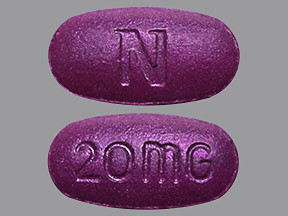ESOMEPRAZOLE DELAYED-RELEASE TABLET - ORAL
PHONETIC PRONUNCIATION: (ES-oh-MEP-ra-zole)
COMMON BRAND NAME(S): Nexium 24HR
GENERIC NAME(S): esomeprazole magnesium
Uses
USES: Esomeprazole is used to treat certain stomach and esophagus problems (such as acid reflux, ulcers). It works by decreasing the amount of acid your stomach makes. It relieves symptoms such as heartburn, difficulty swallowing, and persistent cough. This medication helps heal acid damage to the stomach and esophagus, helps prevent ulcers, and may help prevent cancer of the esophagus. Esomeprazole belongs to a class of drugs known as proton pump inhibitors (PPIs). If you are self-treating with this medication, over-the-counter esomeprazole products are used to treat frequent heartburn (occurring 2 or more days a week). Since it may take 1 to 4 days to have full effect, these products do not relieve heartburn right away. For over-the-counter products, carefully read the package instructions to make sure the product is right for you. Check the ingredients on the label even if you have used the product before. The manufacturer may have changed the ingredients. Also, products with similar brand names may contain different ingredients meant for different purposes. Taking the wrong product could harm you.
How to use ESOMEPRAZOLE DELAYED-RELEASE TABLET - ORAL
HOW TO USE: Read the Patient Information Leaflet if available from your pharmacist before you start taking esomeprazole and each time you get a refill. If you have any questions, ask your doctor or pharmacist. If you are taking the over-the-counter product to self-treat, read and follow all directions on the product package before taking this medication. If you have any questions, consult your pharmacist. If your doctor has prescribed this medication, take it as directed, usually once daily. Do not crush or chew this medication. Swallow the tablets whole. The dosage and length of treatment are based on your medical condition and response to treatment. Do not increase your dose or take this drug more often than directed. If you have any questions, ask your doctor or pharmacist. If needed, antacids may be taken along with this medication. If you are also taking sucralfate, take esomeprazole at least 30 minutes before sucralfate. Use this medication regularly to get the most benefit from it. To help you remember, take it at the same time each day. Continue to take this medication for the prescribed length of treatment even if you are feeling better. If you are self-treating with the over-the-counter product, do not take it for more than 14 days unless directed by your doctor. Tell your doctor if your condition persists or worsens. If you are self-treating, tell your doctor if your heartburn persists after 14 days or if you need to use this medication more than once every 4 months. The risk of side effects goes up over time. Ask your doctor how long you should take this medication. If you think you may have a serious medical problem, get medical help right away.
Side Effects
Precautions
Interactions
Overdose
Images
Reviews
Faq for ESOMEPRAZOLE DELAYED-RELEASE TABLET - ORAL
- Esomeprazole delayed-release tablet is used to treat stomach and esophagus problems such as acid reflux, ulcers, and gastroesophageal reflux disease (GERD).
- Esomeprazole belongs to a class of drugs called proton pump inhibitors (PPIs). It works by decreasing the amount of acid produced in the stomach, thus reducing symptoms such as heartburn and stomach pain.
- The dosage of Esomeprazole can vary depending on the specific condition being treated. It is important to follow the directions provided by your doctor or pharmacist. Generally, the recommended dose is 20mg or 40mg per day, taken once daily.
- Common side effects of Esomeprazole include headache, diarrhea, nausea, stomach pain, gas, and dry mouth. However, if you experience more severe side effects such as severe abdominal pain, chest pain, or difficulty swallowing, seek immediate medical attention.
- Esomeprazole may interact with certain medications, so it is important to inform your doctor about all the medications and supplements you are taking. Some drugs that may interact with Esomeprazole include clopidogrel, methotrexate, digoxin, and certain anti-HIV medications.
- It is important to consult your doctor before taking Esomeprazole if you are pregnant or planning to become pregnant. Generally, it is considered safe to use during pregnancy. However, it is not recommended to breastfeed while taking this medication as it may pass into breast milk.
- Esomeprazole typically starts working within 1 hour of taking it, with maximum effect seen within 2 to 4 hours. However, it may take a few days to a week to experience the full benefits of the medication.
- No, you should swallow the tablet whole with a glass of water. Do not crush or chew the tablet, as it is designed to be released slowly in the body.
- It is generally safe to drink alcohol in moderation while taking Esomeprazole. However, excess alcohol consumption can increase the risk of stomach irritation and may worsen the symptoms of acid reflux.
Disclaimer
IMPORTANT: HOW TO USE THIS INFORMATION: This is a summary and does NOT have all possible information about this product. This information does not assure that this product is safe, effective, or appropriate for you. This information is not individual medical advice and does not substitute for the advice of your health care professional. Always ask your health care professional for complete information about this product and your specific health needs.

No Reviews Yet